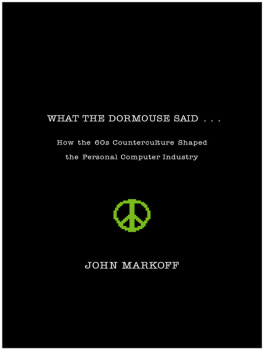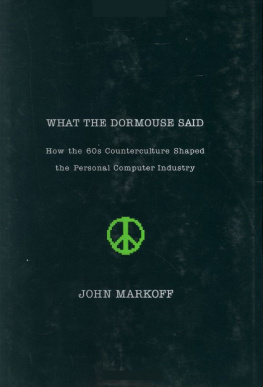Praise for What the Dormouse Said
At the core of Dormouse lies a valid and original historical point.
The New York Times
A convincing case. This makes entertaining reading.
The New York Times
Evocative
Newsweek
Fascinating
Computerworld
FascinatingMarkoff is a wonderful writer and storyteller, and he effortlessly weaves together the stories of the main cast of characters. The individuals had the most unusual knack for crossing paths, and Markoffs ability to show these sometimes tangentialbut always importantrelationships, without losing the thread of the story, is impressive.
The Christian Science Monitor
Nobody writes about computer technology better than Markoff, who gives us insights into the people, history and societal pressures that drive breakthroughs and new developments. Here he convincingly traces the birth of personal computing to the counterculture ethos of the Bay Area in the 60s.
San Jose Mercury News
Shows how almost every feature of todays home computerscan be traced to two Stanford research facilities that were completely immersed in the counterculture. The combustive combination of radical politics and technological ambition is laid out so convincingly, in fact, that its mildly disappointing when, in the closing pages, Markoff attaches momentous significance to a confrontation between the freewheeling Californian computer culture and a young Bill Gates only to bring the story to an abrupt halt. Hopefully, hes already started work on the sequel.
Publishers Weekly (starred review)
A lively prehistory of Silicon Valley and its brilliant denizens of yore. Technogeeks will know much of this history already, but Markoff does a fine job of distilling it here while pointing out how much bleaker the world might be if the pioneers had just said no.
Kirkus Reviews
Striking. a fine job of recording the history of that exceptional time. Both informative and entertaining, this book should appeal to a broad audience of technology readers.
Library Journal
Thanks to the cunning of history and the wondrous strangeness of Northern California, the utopian counterculture, psychedelic drugs, military hardware and antimilitary software were tangled together inextricably in the prehistory of the personal computer. Full of interesting details about weird but not arbitrary connections, John Markoffs book tells one of the oddestbecause truestof California tales and thereby helps illuminate the still unsettled legacy of the Sixties.
Todd Gitlin, author of Media Unlimited and The Sixties: Years of Hope, Days of Rage
It is easy to see how the personal computer has shaped contemporary culture. But how did contemporary culture shape the emergence of the personal computer? In this innovative, lively narrative, veteran technology reporter and cultural critic John Markoff demonstrates how the values and obsessions of the 1960s, especially as centered in the San Francisco Bay Area, created the environment for the emergence of the personal computer as social tool and cultural catalyst.
Kevin Starr, author of Coast of Dreams: California on the Edge, 19902003
John Markoff s wonderful recounting of the origins of personal computerdom makes a mind-blowing case that our current silicon marvels were inspired by the psychedelic-tinged, revolution-minded spirit of the Sixties. Its a total turn-on.
Steven Levy, author of Hackers, Crypto , and Insanely Great
Beautifully written, What the Dormouse Said does that important job of placing in a historical context the development of modern computer technology. It tells us not only what happened, but why. These people changed our world as much as any group ever and now I understand not only how it came to be but also why it was probably inevitable.
Robert X. Cringely, author of Accidental Empires and host of the PBS series Triumph of the Nerds
Reviled and demonized, then trivialized by the official culture it so exuberantly opposed, the counterculture of the 1960s nevertheless remains the 2000-pound gorilla in the china closet of recent American history. With elegance and efficiency, What The Dormouse Said charts one of the most important and overlooked songlines from that mind-expanding moment. Tune in, turn on, boot up!
Jay Stevens, author of Storming Heaven: LSD and the America Dream and Burning Down the House
What the Dormouse Said
How the Sixties Counterculture Shaped the Personal Computer Industry
JOHN MARKOFF
PENGUIN BOOKS
PENGUIN BOOKS
Published by the Penguin Group
Penguin Group (USA) Inc., 375 Hudson Street, New York, New York 10014, U.S.A.
Penguin Group (Canada), 90 Eglinton Avenue East, Suite 700, Toronto,
Ontario, Canada M4P 2Y3 (a division of Pearson Penguin Canada Inc.)
Penguin Books Ltd, 80 Strand, London WC2R 0RL, England
Penguin Ireland, 25 St Stephens Green, Dublin 2, Ireland (a division of Penguin Books Ltd)
Penguin Group (Australia), 250 Camberwell Road, Camberwell,
Victoria 3124, Australia (a division of Pearson Australia Group Pty Ltd)
Penguin Books India Pvt Ltd, 11 Community Centre,
Panchsheel Park, New Delhi110 017, India
Penguin Group (NZ), cnr Airborne and Rosedale Roads, Albany,
Auckland 1310, New Zealand (a division of Pearson New Zealand Ltd)
Penguin Books (South Africa) (Pty) Ltd, 24 Sturdee Avenue,
Rosebank, Johannesburg 2196, South Africa
Penguin Books Ltd, Registered Offices:
80 Strand, London WC2R 0RL, England
Copyright John Markoff, 2005
All rights reserved
Grateful acknowledgment is made for permission to reprint an excerpt from White Rabbit by Grace Slick. 1966, 1994 Irving Music, Inc./BMI. Used by permission. International copyright secured. All rights reserved.
THE LIBRARY OF CONGRESS HAS CATALOGED THE HARDCOVER EDITION AS FOLLOWS:
Markoff, John.
What the dormouse said: how the sixties counterculture shaped the personal computer industry / John Markoff.
p. cm.
Includes bibliographical references and index.
ISBN: 978-1-1012-0108-4
1. MicrocomputersHistory. 2. Computers and civilization. 3. Nineteen sixties. I. Title.
QA76.17.M37 2005
004.16dc22 2004061181
Except in the United States of America, this book is sold subject to the condition that it shall not, by way of trade or otherwise, be lent, resold, hired out, or otherwise circulated without the publishers prior consent in any form of binding or cover other than that in which it is published and without a similar condition including this condition being imposed on the subsequent purchaser.
The scanning, uploading and distribution of this book via the Internet or via any other means without the permission of the publisher is illegal and punishable by law. Please purchase only authorized electronic editions, and do not participate in or encourage electronic piracy of copyrighted materials. Your support of the authors rights is appreciated.
TO LESLIE
When logic and proportion
Have fallen sloppy dead
And the White Knight is talking backwards
And the Red Queens Off with her head!











